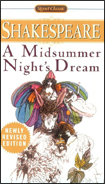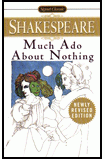A Midsummer Night's Dream
by William Shakespeare
| |||||||||||||
A Midsummer Night’s Dream is especially appropriate for senior high students because its major theme is love – a subject on the minds of most teenagers much of the time. There is plenty of comedy to entice those who are not interested in love, and although there are fairies, they are not like Tinker Bell in Peter Pan. Even the most reluctant student should have fun with the Pyramus and Thisby production by the artisans.
Another theme is friendship. Friends and what they think and say are extremely important to adolescents. Most will have had some experience of two friends liking the same person of the opposite sex and the difficulties that situation brings about.
Illusion versus reality is another theme students should enjoy looking into. Teenagers are well aware things are not always as they seem, and this is especially true in A Midsummer Night’s Dream where almost nothing is what it seems to be. Then too there is the parent-child conflict over who the child can be in love with—not at all an uncommon situation for many young people. Hermia’s rebellion against her father ends happily, but Thisby’s rebellion ends in death. However, the farcical nature of the play within the play as presented by the artisans keeps this from being tragic, as in Romeo and Juliet.
This teacher’s guide is organized in the following manner: a brief overview followed by teaching ideas to be used before, during, and after reading the play. These ideas are meant to help students understand the play as well as explore issues confronted in the play that have importance in the students’ lives.
OVERVIEW SYNOPSISAct I, scene i
Theseus and Hippolyta discuss their wedding which is to take place in four days. Theseus sends Philostrate to round up entertainers to while away the time. Egeus brings his daughter Hermia and her two suitors, Lysander and Demetrius, to Theseus to settle an argument. Hermia wants to marry Lysander. Eegus wants her to marry Demetrius. Theseus gives Hermia three choices – marry Demetrius, enter a nunnery, or be put to death for disobedience. Hermia has until the day of Theseus’s wedding to come to a decision. Lysander and Hermia plan to meet in the woods the next night and elope. Helena, who loves Demetrius and is the lovers’ friend, decides she will tell Demetrius of their plans so she can be with him while he looks for Hermia and Lysander.
Act I, scene ii
Six artisans meet to discuss what sort of entertainment they will prepare for Theseus’s wedding. They decide to do a play about Pyramus and Thisby. Parts are assigned.
Act II, scene i
A fairy meets Puck in the woods, and they discuss the quarrel between Titania (Queen of the Fairies) and Oberon (King of the Fairies) over a human child they both want. Oberon and Titania meet and talk about the upcoming wedding of Theseus and Hippolyta. Titania says the bad weather can be blamed on their quarrels. The human child is the son of one of her devoted followers who died at childbirth. She refuses to turn him over to Oberon. Oberon sends Puck to find a special flower whose juice, when placed on the eyelids, causes that individual to fall in love with the next living creature seen. He plans to put it on Titania’s eyelids to shame her into giving up the boy. Helena and Demetrius come hunting for Hermia. Despite Demetrius’s insults and threats, Helena says she will follow him wherever he goes. Oberon tells Puck to put some of the juice on Demetrius’s eyes so he will fall in love with Helena when he awakens.
Act II, scene ii
Titania tells the fairies to sing her to sleep. Oberon places some of the juice on her eyelids and hopes she sees something vile when she wakes up. Lysander and Hermia are tired and lost and decide to sleep awhile. Puck mistakenly puts the juice on Lysander’s eyes. When Helena finds Lysander she awakens him. He, of course, falls in love with her instantly. Helena thinks he is making fun of her and runs away. He follows. Hermia awakens, can’t find Lysander, and goes looking for him.
Act III, scene i
The six artisans come to the woods to practice for their play. Puck watches for a while and then puts an ass’s head on Bottom and chases the others about the woods. Bottom begins to sing to prove he isn’t afraid; Titania awakens and, with the magic juice on her eyelids, falls in love with Bottom disguised as an ass. She sends her fairies to find special things for Bottom to eat. Bottom is not the least bit surprised and loves the attention.
Act III, scene ii
Puck tells a pleased Oberon of his trick on Bottom and of Titania’s infatuation. However, when Hermia and Demetrius enter quarreling, Oberon realizes Puck has made a mistake. Puck goes to find Lysander and Helena while Oberon puts the magic juice on Demetrius’s eyelids. Helena is still sure that Lysander is making fun of her. Demetrius awakens and immediately loves Helena. When he and Lysander quarrel over her, they go off to fight a duel for her. Puck leads the two young men about he forest and when they eventually fall asleep, he puts an antidote on Lysander’s eyes.
Act IV, scene i
Bottom orders the fairies about before falling asleep in Titania’s arms. Oberon tells Puck that Titania had given the boy to him. Ashamed of himself, he decides to release her from her spell and awakens her. Titania thinks she has had a bad dream. She and Oberon reconcile. Theseus, Hippolyta, Egeus, and the others enter planning to celebrate the May morning with a hunt. They find the four young people, awaken them, and listen to explanations. Theseus decides both couples should marry on his and Hippolyta's wedding day. The four lovers follow the rest back to the castle talking about their unusual dreams. Bottom awakens, wonders where the other players are, and decides to write a song about his dreams.
Act IV, scene ii
The other five artisans have despaired of Bottom's return and fear the play cannot be presented. Bottom returns and urges all to get ready for the play because the Duke and his bride and the two other couples await their entertainment.
Act V, scene i
Theseus and Hippolyta can't believe the stories the four young people tell. Theseus asks Philostrate what entertainment he has found to while away the time before bed. When given a list of possibilities, he chooses the play of Pyramus and Thisby in its "tragical mirth." Philostrate says it is awful and not worth watching but Theseus insists. The players present a truly funny version of the tragedy of Pyramus and Thisby. The three pairs of lovers make comments throughout the play with the play, both to the actors and to each other and note the silliness of the two tragic lovers. The play over, the three couples go off to bed leaving the house to the fairies, led by Oberon and Titania, who sing and dance and bless the couples, their possible offspring, and every room in the castle. In his closing speech, Puck asks the audience to forgive any offense caused by the play believing it was all just a dream.















